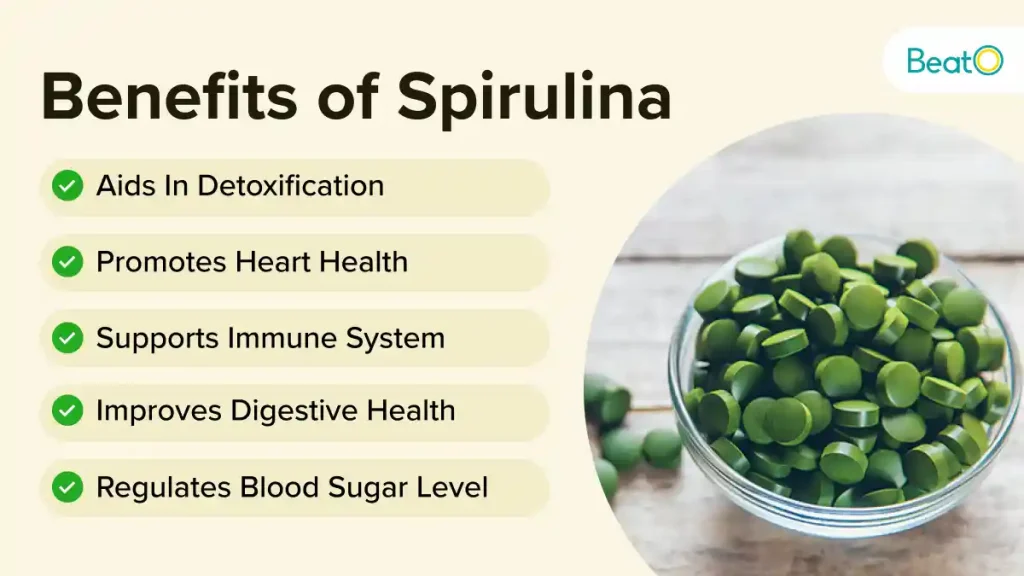On every list of superfoods, one is likely to find spirulina. Numerous Spirulina benefits are extensive and well-documented, making it a must-have for those seeking to enhance their health naturally. This bright blue-green algae is rich in nutrients and provides many health benefits such as enhancing energy and optimising the immune system. Spirulina has come into the limelight in the recent past due to its richness in nutrients and the fact that it is used as a supplement in our diets.

In this article, we’ll learn about 15 incredible spirulina benefits that can positively impact your health. You will learn about how spirulina helps in energy production, strengthens the immune system, and benefits the heart, among many others. Finally, you will be able to perceive spirulina as a superfood and comprehend the potential of its usage in one’s diet.
Here Are 15 Spirulina Benefits

1. Rich in Nutrients
Spirulina is a treasure trove of necessary proteins, vitamins, and minerals that the body requires every single day. It contains a rich vitamin profile, especially the vitamins B, K, iron, magnesium, and potassium. Due to its high nutrient concentration, spirulina is appropriate for consumption in any diet and can be highly advantageous to anyone who wants to increase their nutrient consumption.
2. Boosts Energy Levels
One of the most celebrated spirulina benefits is its ability to boost energy. Spirulina’s protein-rich and nutrient-dense content makes it useful in boosting energy and fighting off fatigue during the day. It also helps in the transportation of oxygen in the blood, which in turn promotes energy production in the body and organs.
3. Supports Immune System
One of the most health-related benefits of spirulina is that it boosts the immune system. It is chock full of antioxidants such as phycocyanin, which play a role in preventing cellular damage and fortifying the body’s defence systems. Spirulina is packed with immune-boosting nutrients that can help build up your body’s resistance against disease.
Also Read: 10 Surprising Halim Seeds Benefits You Need To Know
4. Anti-Inflammatory Properties
Inflammation is a potent contributor to chronic diseases. Spirulina benefits include potent anti-inflammatory effects due to its high levels of antioxidants and phycocyanin. They assist in diminishing inflammation and oxidative stress in body tissues.
5. Promotes Heart Health
The effects of spirulina on heart health have been studied and have also been found to be beneficial. It can aid in reducing cholesterol levels and blood pressure and enhance all-round heart functionality. This makes spirulina very effective in enhancing the healthy functioning of the heart.
6. Aids in Detoxification
Spirulina benefits also extend to detoxification. It binds with heavy metals and toxins in the body to help facilitate their excretion. This action contributes to the detoxification processes in the body and may aid in liver detoxification.
Also Read: Ardha Chakrasana Benefits: The Key To Overall Health And Wellness
7. Supports Healthy Weight Loss
Spirulina can help with weight loss, and therefore, it should be added to your diet plan. It is rich in proteins that assist in making you have long-lasting satiety, thus resulting in a reduced intake of calories. Furthermore, spirulina enhances the metabolic rate, thus helping in weight management.
8. Enhances Brain Function
Spirulina benefits cognitive health by supporting brain function. It has nutrients that are vital for the heart and the rest of the body, such as omega-3 fatty acids. A relatively recent study conducted on spirulina has shown that it optimises memory, concentration, and brain function.
9. Improves Digestive Health
Spirulina enhances the health of the digestive system. It helps in the development of beneficial microorganisms in our stomach, which is vital for digestion and the absorption of nutrients. Spirulina is very rich in fibre, which thus helps in digestion and also maintains the healthy functioning of the bowels.
Also Read: 7 Incredible Bael Fruit Benefits For A Healthier You
10. Supports Skin Health
Spirulina benefits the skin by providing essential nutrients that promote a healthy complexion It contains antioxidants, which help the body fight free radicals, hence diminishing ageing signs and enhancing skin firmness. Spirulina can also help treat skin conditions such as acne and eczema.
11. Regulates Blood Sugar Levels
It is especially beneficial for those who have diabetes because spirulina regulates and stabilises sugar levels in the blood. It aids in the control of the blood sugar level by increasing insulin sensitivity. As such, it serves as an effective addition to control blood glucose fluctuation and maintain it at an optimal level.
12. Reduces Allergy Symptoms
It has been noted that spirulina can be effective in combating allergies. It is also useful in reducing the intensity of the allergic reaction since it prevents the release of histamines. It may help to alleviate symptoms such as sneezing, itchiness and nasal congestion.
13. Boosts Athletic Performance
Spirulina has various therapeutic properties that can be very useful to athletes. It promotes stamina, minimises muscle soreness and fatigue, and accelerates the recovery process. Protein and nutrients are useful for muscle tissue repair and enhanced general performance among athletes.
Also Read: Best Green Tea For Weight Loss In India
14. Supports Eye Health
Spirulina benefits eye health due to its high levels of beta-carotene and zeaxanthin. These antioxidants prevent free radicals from affecting the eyes and help prevent diseases such as macular degeneration and other eye ailments that are associated with old age.
15. Enhances Mood and Mental Health
Spirulina has a lot of potential benefits regarding mood and mental state. It is packed with nutrients that play a role in the synthesis of neurotransmitters such as serotonin and dopamine that help keep the mood up and enhance the quality of mental well-being.
Potential Side Effects
While spirulina is generally considered safe for most people, it’s also important to be aware of its potential side effects. Here are some possible side effects you need to know about:
Digestive Issues
A few side effects like nausea, bloating, or loose motions can be seen in some people, mainly during the initial days of using spirulina.
Allergic Reactions
However, it is also important to know that, even though spirulina is considered safe for consumption, some individuals may develop an allergic reaction to it. Allergies have symptoms like skin rashes, swelling of the face and other parts of the body, and even breathing issues.
Also Read: Boiled Eggs Benefits Unveiled: The Key To A Healthier You
Interactions with Medications
Spirulina has been known to interact with some drugs, most of which are those that modulate the immune system. If you are on prescription drugs, it is recommended that you talk to your healthcare provider before you begin taking vitamin and mineral supplements.
Heavy Metal Contamination
Spirulina is known to have binding properties that allow it to attach itself to heavy metals, so people who wish to use spirulina must make sure that they are getting it from a reputable source.
Phenylketonuria (PKU)
People with PKU should not take spirulina because it has phenylalanine that they are unable to break down.
Autoimmune Conditions
Spirulina is not recommended for individuals with autoimmune disorders because it may increase the immune response.
Also Read: The Top 7 Popcorn Benefits For Weight Loss
Pregnancy and Breastfeeding
Pregnant or breastfeeding women should consult with their healthcare provider before using spirulina to ensure that it is safe for them to use.
Conclusion
Incorporating spirulina into your daily routine can provide numerous health benefits. It is a natural source of vitamins, minerals and proteins that help to increase energy, improve the immune system, support cardiovascular health and improve cognitive functions. The presence of a good proportion of nutrients and its anti-inflammatory and detoxification functions make it a perfect supplement to any diet. But one must understand the possible side effects and also, always, get spirulina from authentic sources. By understanding and utilising the 15 spirulina benefits discussed in this article, you can take a significant step towards improving your overall health and well-being. It is important to seek advice from a healthcare provider before consuming spirulina to avoid any side effects of the product. In moderation, though, spirulina can be a helpful friend on the road to recovery and improved overall wellbeing.
Disclaimer: The content of this article is compiled information from generic and public sources. It is in no way a substitute, suggestion, or advice for a qualified medical opinion. Always consult a specialist or your doctor for more information. BeatoApp does not claim responsibility for this information.
Finding the best glucometer online can turn out to be a tedious task. So, try Beato, a Doctor-recommended smart glucometer kit, an affordable step towards healthcare.




